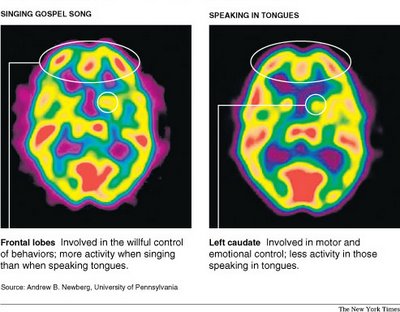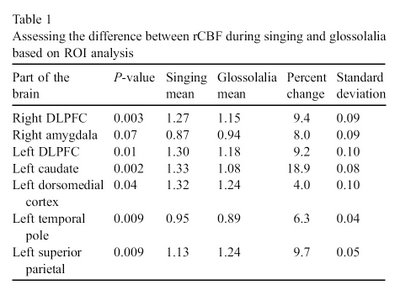Neuroscience

Looks like the New York Times has a case of glossolalia (and a better SPECT image than Psychiatry Research: Neuroimaging).

As I mentioned, oh, just the other day, (1) the authors did not correct for multiple comparisons, (2) the spatial resolution of SPECT is not that great, and (3) the rCBF reductions in right dorsolateral prefrontal cortex and (especially) the left caudate were their most significant findings.
Now The Neurocritic has been meaning to do a post on the left caudate nucleus and language since, oh, June, when the Science paper by Crinion et al. came out.
Just haven't gotten around to it yet, perhaps it should be my next post.
[After the deadline for submitting abstracts for the Cognitive Neuroscience Society meeting. Whatever.]
Anyway.
But no. Here's what they say instead:
- Tongue-tied: When Bilinguals Switch Languages Involuntarily
People who can communicate in more than one language – bilinguals - are intriguing to psychologists. A new study focuses on how bilinguals switch between tongues – how come they don't mix up words from different languages? A prevailing view is...
- Sie Ist Gefundene Steuerung Über Two Languages: Part 2
In the last post, The Neurocritic examined an fMRI experiment by Crinion et al. (2006) that utilized a semantic priming design to examine language switching in fluent bilinguals. It turned out that activity in a subcortical region in the basal ganglia,...
- Glossolalia
Talking Heads Glossolalia, or speaking in tongues, comprises the utterance of semantically meaningless syllables. Glossolalia is claimed by some to be an unknown mystical language; others claim that glossolalia is the speaking of an unlearned foreign...
- Bilingualism And The Brain
A new study about the relation between the brain and bilinualism, as presented in a Reuters news report:Learning 2nd Language Changes Brain Anatomy - Study Wed 13 October, 2004 19:18 By Patricia Reaney LONDON (Reuters) - Being bilingual produces...
- Memory Divided
The new October issue of the American Psychological Association's Monitor on Psychology includes several short articles of interest to neuroscience readers. One of these articles is about one researcher's career of researching memory systems....
Neuroscience
The New York Times Is Speaking In Tongues

Looks like the New York Times has a case of glossolalia (and a better SPECT image than Psychiatry Research: Neuroimaging).
A Neuroscientific Look at Speaking in TonguesBelow is Table 1 from the paper of Newberg et al. (2006).
The passionate, sometimes rhythmic, language-like patter that pours forth from religious people who "speak in tongues" reflects a state of mental possession, many of them say. Now they have some neuroscience to back them up.

As I mentioned, oh, just the other day, (1) the authors did not correct for multiple comparisons, (2) the spatial resolution of SPECT is not that great, and (3) the rCBF reductions in right dorsolateral prefrontal cortex and (especially) the left caudate were their most significant findings.
Now The Neurocritic has been meaning to do a post on the left caudate nucleus and language since, oh, June, when the Science paper by Crinion et al. came out.
Just haven't gotten around to it yet, perhaps it should be my next post.
[After the deadline for submitting abstracts for the Cognitive Neuroscience Society meeting. Whatever.]
Anyway.
Crinion J, Turner R, Grogan A, Hanakawa T, Noppeney U, Devlin JT, Aso T, Urayama S, Fukuyama H, Stockton K, Usui K, Green DW, Price CJ. (2006). Language control in the bilingual brain. Science 312:1537-4.As usual, The Neurocritic was going to find something to criticize about the notion that "the left caudate plays a universal role in monitoring and controlling the language in use." However, if Newberg and colleagues had read the Crinion article, which was available when their revised manuscript was submitted, they could have speculated that reduced rCBF in the left caudate was related to the the loss of control, specifically of "monitoring and controlling the language in use."
How does the bilingual brain distinguish and control which language is in use? Previous functional imaging experiments have not been able to answer this question because proficient bilinguals activate the same brain regions irrespective of the language being tested. Here, we reveal that neuronal responses within the left caudate are sensitive to changes in the language or the meaning of words. By demonstrating this effect in populations of German-English and Japanese-English bilinguals, we suggest that the left caudate plays a universal role in monitoring and controlling the language in use.
But no. Here's what they say instead:
The significant decrease in the left caudate is of uncertain significance but may relate to the altered emotional activity during glossolalia.Uh, NO. Instead of saying anything insightful about language and the caudate, they cite mostly religious articles.
Ms. Morgan, a co-author of the study, was also a research subject. She is a born-again Christian who says she considers the ability to speak in tongues a gift. "You’re aware of your surroundings," she said. "You’re not really out of control. But you have no control over what’s happening. You're just flowing. You’re in a realm of peace and comfort, and it’s a fantastic feeling."Isn't that a conflict of interest? Not that she's born-again, but that she participated in her own research study.
- Tongue-tied: When Bilinguals Switch Languages Involuntarily
People who can communicate in more than one language – bilinguals - are intriguing to psychologists. A new study focuses on how bilinguals switch between tongues – how come they don't mix up words from different languages? A prevailing view is...
- Sie Ist Gefundene Steuerung Über Two Languages: Part 2
In the last post, The Neurocritic examined an fMRI experiment by Crinion et al. (2006) that utilized a semantic priming design to examine language switching in fluent bilinguals. It turned out that activity in a subcortical region in the basal ganglia,...
- Glossolalia
Talking Heads Glossolalia, or speaking in tongues, comprises the utterance of semantically meaningless syllables. Glossolalia is claimed by some to be an unknown mystical language; others claim that glossolalia is the speaking of an unlearned foreign...
- Bilingualism And The Brain
A new study about the relation between the brain and bilinualism, as presented in a Reuters news report:Learning 2nd Language Changes Brain Anatomy - Study Wed 13 October, 2004 19:18 By Patricia Reaney LONDON (Reuters) - Being bilingual produces...
- Memory Divided
The new October issue of the American Psychological Association's Monitor on Psychology includes several short articles of interest to neuroscience readers. One of these articles is about one researcher's career of researching memory systems....
